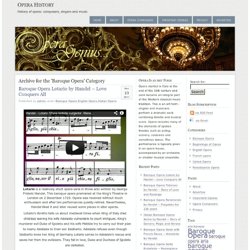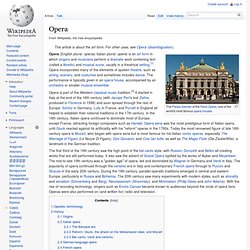

Part 1 of the 3rd International Singing Competition for Baroque Opera Innsbruck. Final - 2nd International Singing Competition for Baroque Opera PIETRO ANTONIO CESTI 2011 - Part 3. Baroque Opera - Home. Baroque Opera « Categories « Opera History. In his early twenties future opera genius and famous baroque composer George Frideric Handel spent several years in Italy.

While Handel was staying in Rome another great baroque composer Alessandro Scarlatti presented him to cardinal Vincenzo Grimani. In spite of being a religious figure of importance and a distinguished diplomat Grimani wrote libretti in his spare time, and acted as an unofficial theatrical agent for the Italian royal courts. He made Handel his protégé, and gave him his libretto for a future baroque opera Agrippina . Libretto tells the story of the ancient imperial Rome intrigues. Opera. Opera (English plural: operas; Italian plural: opere) is an art form in which singers and musicians perform a dramatic work combining text (called a libretto) and musical score, usually in a theatrical setting.[1] Opera incorporates many of the elements of spoken theatre, such as acting, scenery, and costumes and sometimes includes dance.

The performance is typically given in an opera house, accompanied by an orchestra or smaller musical ensemble. Opera is part of the Western classical music tradition.[2] It started in Italy at the end of the 16th century (with Jacopo Peri's lost Dafne, produced in Florence in 1598) and soon spread through the rest of Europe: Schütz in Germany, Lully in France, and Purcell in England all helped to establish their national traditions in the 17th century. In the 18th century, Italian opera continued to dominate most of Europe, except France, attracting foreign composers such as Handel. Operatic terminology[edit] History[edit]